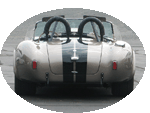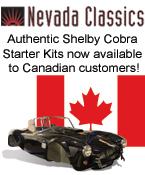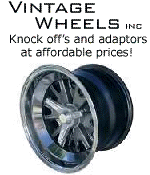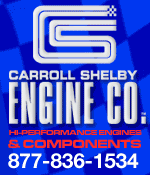 
 Main Menu
Main Menu
|
 Nevada Classics
Nevada Classics
|
 Advertise at CC
Advertise at CC
|
 November 2024
November 2024
|
| S |
M |
T |
W |
T |
F |
S |
| |
|
|
|
|
1 |
2 |
| 3 |
4 |
5 |
6 |
7 |
8 |
9 |
| 10 |
11 |
12 |
13 |
14 |
15 |
16 |
| 17 |
18 |
19 |
20 |
21 |
22 |
23 |
| 24 |
25 |
26 |
27 |
28 |
29 |
30 |
|
 CC Advertisers
CC Advertisers
|
|

01-17-2008, 11:07 AM
|
|
CC Member

|
|
|
Join Date: May 2006
Location: Exeter,
CA
Cobra Make, Engine: KMP 498
Posts: 495
|
|

 Not Ranked
Not Ranked
 Getting Close to Start Up-What else can I Screw Up?
Getting Close to Start Up-What else can I Screw Up?
With my flat tappet cam with shell lifter: - I used all the supplied comp cams lube on lobes.
- I am running Rotella Diesel Truck oil 30wt.
- I pre-Lubbed the engine with my dril.
I really do not want to run the engine with the valve springs out- I never see any top fuel guys do that.
What do you think? |
-
Advertising


01-17-2008, 11:51 AM
|
 |
CC Member

|
|
|
Join Date: Dec 2000
Location: Broken Arrow. OK ( South Tulsa), USA,
OK
Cobra Make, Engine: 66 COBRA FE 427 /4SP. (HCS Coupe w/ 408 Stroker and TKO 600 -sold)
Posts: 5,595
|
|

 Not Ranked
Not Ranked
If you are running double springs pull the inside spring out if not, then don't worry about it. Keep your RPM's at 2000 for 15-20 mins at least. Shut your engine off, change the oil and put in a new filter (check for any debris in the oil and also your filter). Put in more oil and a filter and start it back up and let it run at about 1000 RPM for a little longer. Remove your filter and cut it apart and check for any gold or copper flakes. Put on a new filter again and top off the oil.
Don't worry about anything you find in your oil that isn't metallic or shinney. It probably would not be a bad idea to pick up some of the GM solid lifter cam breakin addative ($10/pint) to run in your car for the first 300-400 miles.
Clois
__________________
Sunshine, Asphalt and no stop signs...Perfect
"Let's roll"
"Be part of Something Good
......Leave Something Good Behind!"
from CD "Long Road Out of Eden"
Last edited by Clois Harlan; 01-17-2008 at 11:56 AM..
|

01-17-2008, 01:10 PM
|
|
CC Member

|
|
|
Join Date: Dec 2001
Location: Louisville,
KY
Cobra Make, Engine: I'm Cobra-less!
Posts: 9,417
|
|

 Not Ranked
Not Ranked
Set your timing ahead of time so that it will fire right off and run.
Pull the distributor out, get #1 cylinder at TDC of the compression stroke (make sure compression) and put the balancer on 0. Then turn the engine in normal rotation until the balancer is at 18-20 degrees. This will give you plenty of advance to fire. If you leave it on 0, it will be late and you'll be fiddling with the distributor to get it to fire.
Now put the distributor in and make sure the rotor points at #1 plug.
As Clois says, take the inner springs out.
Put a big fan in front of the radiator.
|

01-17-2008, 01:15 PM
|
 |
Half-Ass Member

|
|
|
Join Date: Jun 2005
Cobra Make, Engine: ERA #732, 428FE (447 CID), TKO600, Solid Flat Tappet Cam, Tons of Aluminum
Posts: 22,001
|
|

 Not Ranked
Not Ranked
But if you hear something really scary, shut her down immediately.
|

01-17-2008, 02:23 PM
|
 |
CC Member

|
|
|
Join Date: Dec 2000
Location: Livermore,
CA
Cobra Make, Engine: ERA #629, BBM Side Oiler Block, 482ci, Richmond 5 speed
Posts: 852
|
|

 Not Ranked
Not Ranked
Follow these guidelines for engine breakin: http://performanceunlimited.com/docu...nebreakin.html but do add a can of the GM EOS or equivalent. It's needed with today's motor oils.
Chris |

01-17-2008, 03:56 PM
|
|
CC Member / Sponsor

|
|
|
Join Date: Jan 2002
Location: Provo,
UT
Cobra Make, Engine: Daytona Coupe
Posts: 1,359
|
|

 Not Ranked
Not Ranked
While you are pumping up the oiling system it is a good idea to pull the valve covers and look and see if the valve train is getting oil. The FE with the oil going up the rocker arm stud is really easy to get wrong...
Also high detergent (diesel) oils are not the best for break in. They tend to clean the cams of cam lube. After break in Rotella should work great. |

01-17-2008, 04:12 PM
|
 |
CC Member

|
|
|
Join Date: May 2001
Location: California,
Ca
Cobra Make, Engine: NAF 289 Slabside Early Comp Car with 289 Webers and all the goodies. Cancelling the efforts of several Priuses
Posts: 6,592
|
|

 Not Ranked
Not Ranked
Clois: The EOS (Engine Oil Suppliment) is NLA once the current stocks in the dealers are depleated. Thank you EPA. (Great stuff if you cand find some).
__________________
Rick
As you slide down the Banister of Life, may the splinters never be pointing the wrong way 
|

01-17-2008, 07:47 PM
|
|
CC Member

|
|
|
Join Date: Nov 2001
Location: Prineville,
OR
Cobra Make, Engine: Contemporary / FE
Posts: 130
|
|

 Not Ranked
Not Ranked

Hello Big-Boss
Regarding break-in may I make a few suggestions.
1. One very effective way to assure minimizing break in problems is to send your cam and lifters to Mr. Scott Maine who owns Cam Research in Colorado. His phone number is 303-762-8196. Scott is an outstanding engine builder and a competitor in Engine Masters every year. Scott has engineered and built a machine that pre-breaks your cam in for you. The cam is broke in using increasing pressure against the lifters that are constantly flooded by cool oil. The lifters are then marked for each lobe location and packaged along with the cam. The cost to do this is approximately $60.00 and shipping. He usually takes 3-4 days to do this then returns it to you. May I submit that is cheap insurance and is worth the time to wait. Scott has done serveral cams for me and I have not had any failures with this method.
Let me point out the not so seen benefits
1. If your engine doesn't fire right up you don't have to worry wbout wiping all the start up lube off your cam and ruining your lobes.
2. You can fire up and go to idle right away if you need to. ( I have a tendency to still run a 2000 with fluctuating throttle for 20 minutes just for good measure though).
3. You don't have to soft spring break in the cam then go through the job of removing and respringing the heads. (This alone makes it worth while.)
4. I would submit that the oil and filter change after a 20 minute run in is still needed to remove other contaminates.
5. You still need to use a high pressure lubricant on the lifters and lobes when you install the cam to protect it during assemble rotation.
If you prefer to install and break-in in the engine there are some oils out there that will work along with some additives to help. A lot of knowledgable people have already commented on this so I will only submit some options for you.
1. Both Crane and Comp offer a break-in additive that really help. It is like the GM EOS. I have used both but seem to lean towards the Crane. (No good reason why.) The Crane part # is 99003-1. Use one bottle per 5 quarts. Because nothing else is was out there some people would continue to run this with the subsequent oil changes. Not the best option as it tends to load up between the rings.
2. There is a new additive on the market that is nothing more than the missing Zinc dialkyl dithiosphosphate in a suspension oil (If I understand this correctly). The claim of this product is it returns 5 quarts of oil to the good SF levels of pre 1988. I am using this now and have not had any failures to date. Not enough time offer a conclusion but it looks good so far. This product is called "ZDDPlus" you can look it up on zddplus@kirbanperformance.com. The nice thing is you can use this with any oil that you like.
3. Regular oils are getting harder to find that will fill this need. The Shell Rotella T seems to maintain it's level of the needed additives. As long as you can locate the CI-4 coding on the back of the bottle.
4. Another thing to keep in mind. Any pre-lube you put on in your engine in a location that does not receive oil under pressure, in other words splash lubricated, needs to be a product that will wash away quickly after the engine fires. This would include but not limited to your lobes, lifters, ends of push rods, rocker arm fulcrumes, rocker arm to valve tips. The reason for this is oil serves two purposes. To lubricate and, relative to this point, to remove heat. High fiction points like cam lobe to lifter interface is a strong case in point here. You need your assembly lubricant to get out of the way quickly and allow the motor oil to do it's cooing job here. I like the red stuff sold under various brands such as Clevite Cam Guard. If you are going to turn the engine over serveral times by hand during the assembly process and are running high spring pressures then I use Cranes assembly lube which has a graphite in it. Using this to just coat the entire suface of the mating parts but not drowned them with it. An oil change after 20 minutes run is is required with a graphite based assembly lube.
5. One last and very important point. Never use anything on the sides of the lifters other than a light weight lubricant such as the motor oil you are going to run in your engine. I have seen times when a heavy viscosity assembly lube has been used here with damaging results. That lifter needs to spin immediately upon fire up and a heavy lube can prevent this. No assembly lube can overcome a no spinning lifter / scuff. The cam is gone.
I hope this helps.
Concobra

|

01-17-2008, 09:10 PM
|
 |
CC Member

|
|
|
Join Date: Sep 2007
Location: Central California,
ca
Cobra Make, Engine: Bennett Cobra
Posts: 70
|
|

 Not Ranked
Not Ranked
It may sound stupid, make sure the cooling system is topped off and the fan(s) are working. I saw a motor damaged because everyone was worried about oil pressure, leaks and other things going on.
A couple minutes at 2,000+ RPM without coolant/water will get the cylinder walls/heads hot real quick!!!  |

01-18-2008, 05:22 AM
|
|
CC Member

|
|
|
Join Date: Jul 2004
Location: Rolla,
MO
Cobra Make, Engine: Shell Valley, '67 Cobra, 1966 427 sideoiler, 2x4s, w/NASCAR toploader
Posts: 126
|
|

 Not Ranked
Not Ranked
 Engine Breakin
Engine Breakin
I don't intend to hi-jack your thread, but I have some information about the zinc issue in today'a oils.
Has anyone heard of "ZDDPlus"? Accjording to information provided by the manufacturer, it contains a much higher level of zinc than the old GM EOS product. I emailed the manufaturer and he provided quite a bit of information.
I have posted his email below. Check out the website. For about 10 bucks a bottle I think it would be a bargain. I apologize for the length of this post, but the zinc issue is important to those of us who prefer the solid flat tappet sound of an FE.
Autosound 2000 Inc. 2557 Faucette Lane, Burlington, NC 27215 www.zddplus.com (336)570-0341 September 18, 2007 Who is Autosound 2000? Autosound 2000 is a company formed by classic car enthusiasts to meet the needs of classic car aficionados. We have seen that the automotive industry in general is changing in response to the environmental and financial pressures of today, with little concern for the classic car industry. We are engineers and automotive technicians by trade, and bring many years of problem solving experience to the task of keeping our classic cars operational and running better than new. We hope that one of the solutions we have designed for our own use will meet your needs as well. We have developed ZddPlus + tm to address the needs of classic car owners for an oil that will meet the specifications of the original oil for which their engines were designed. Why do we need ZddPlus + tm ? As part of an effort to reduce vehicle emissions, the U.S. EPA offers vehicle manufacturers “credits” for early implementation as well as penalties for violation of emission reduction standards. The EPA’s program called for 100,000-mile catalytic converter life by 2004, 120,000 miles by 2007, and 150,000 miles by 2009. To achieve these goals, automotive manufacturers have pressured their oil suppliers to remove substances from motor oils that would shorten the service life, including the proven EP (extreme pressure) additive ZDDP (zinc dialkyldithiophosphate). Zinc and phosphorus from the ZDDP can be present in small amounts in the exhaust gas of an engine depending on the amount of oil which is consumed in combustion. These elements can coat the catalyst reducing the amount of catalyst exposed to the exhaust gases, ultimately increasing emissions at the tailpipe. As a result of the EPA mandate, the ZDDP level in engine oils has been declining since the mid-1990s, roughly coinciding with the implementation of OBDII. ZDDP has been an important additive to engine oils for over 70 years, and has an excellent track record at protecting the sliding metal-to-metal cam lifter interface. Historically, ZDDP has been added to oils in amounts resulting in approximately 0.15% phosphorus, and 0.18% zinc. ZDDP protects by creating a film on cams and flat lifter contact points in response to the extreme pressure and heat at the contact point. The film of zinc and phosphorus compounds provides a sacrificial wear surface protecting the base metal of the cam and lifter from wear. In the course of normal service, this conversion of ZDDP to zinc and phosphorus compounds depletes the ZDDP level in the oil. Studies show that depending on the specific engine and severity of duty, after 2000-4000 miles of operation, the level of ZDDP can drop below that considered adequate to provide wear protection to the cam and lifters.
If you are currently putting mileage on your classic vehicle and using the latest API grade SM oil, you are almost certainly doing irreversible damage to your engine1. According to the SAE Tech Bulletin # 770087 2, operation of a flat tappet engine without adequate EP additives such as ZDDP quickly leads to lifter foot scuffing and cam lobe wear. Camshafts are typically only surface hardened leaving the core ductile for strength. According to the SAE Bulletin, once cam lobe wear reaches 0.0002ײ, “subsequent wear is usually rapid and catastrophic.” Two ten-thousandths of an inch is one fifth the thickness of an average human hair. In order to make engines last in the absence of ZDDP, virtually all IC (internal combustion) engines designed in the last ten years utilize roller lifters. Today, ZDDP has been removed from practically all automotive engine oils, rendering them unsuitable for use with older engines with non-roller lifters. ZddPlus + tm is the ONLY EP (Extreme Pressure) component which re-establishes the ZDDP levels that our classic car engines were designed for, while allowing the car owner to use the base oil of their choice. While some off-the-shelf additives may have some ZDDP, the amount per bottle is small, and when enough is used to get the proper concentration of ZDDP, there is a quart or more of unspecified oil that comes along with it. This dilution of 20% of your oil with an unspecified oil also means that there is 20% less of the proper additive package. The chart below compares the amount of ZDDP in ZddPlus + tm to GM EOS, an additive which claims to provide ZDDP based wear protection.
1 Anderson, William C., ‘New Oils and Old Cars’, Old Cars Weekly, 48 (2007-08-30) 2 Pless, Loren G., and Rodgers, John J., ‘Cam and Lifter Wear as Affected by Engine Oil ZDP Concentration and Type’, SAE pub 770087, 4 (1977)
David Navone
Navone Engineering, Inc. / ZddPlus
4119 Coronado Avenue, Suite 4
Stockton, CA 95204-2336
Cell Phone: 209-298-0454
Shop Phone: 209-465-6139
FAX 209-465-3059
email: dnavone@davidnavone.com
Web: www.zddplus.com

|

01-18-2008, 05:28 AM
|
|
CC Member

|
|
|
Join Date: Dec 2001
Location: Louisville,
KY
Cobra Make, Engine: I'm Cobra-less!
Posts: 9,417
|
|

 Not Ranked
Not Ranked
Also, the cam break in machine isn't 100% effective. I've heard of a couple cases where the cam was broken in on the machine and still wiped the lobes off when installed in the car.
|

01-18-2008, 06:55 AM
|
|
CC Member

|
|
|
Join Date: Jul 2003
Location: West Bloomfield,
MI
Cobra Make, Engine:
Posts: 717
|
|

 Not Ranked
Not Ranked

Since we are working on development of a comparable product I will not comment on the entire paragraph of the ZDDP+ info - - other than to point out that the .0002 cam wear number is likely inaccurate. The chemicals needed are still readily available....
Flat tappet cam cores are flame hardened on rollers at the CWC casting plant before shipping to the two major grinding companies - all in Michigan. The hardness depth has to be enough to allow multiple grinds from a single blank - and is far, far deeper - more likely over .100".
The taper on a cam lobe is what casues lifter rotation and is normally expressed in degrees over a specified distance as measured by an Adcole guage machine. Lacking the ability to measure that with normal tools, we'll expect to see between .001-.002 of taper over the width of a common cam lobe. Once that taper has worn away the lifter will cease to rotate and failure will occur from sliding contact.
Since the interface between cam & lifters is the critical item its hard to get that nailed every time with a machine. All he can do is duplicate what the block is "supposed to be" and cannot duplicate any variances from spec regarding lifter bore placement or angle.
Most of the advice given here is reasonable accurate. I would not worry about Top Fuel engines - they use roller cams. Pull the inner springs out.
__________________
Survival Motorsports
"I can do that....."

Engine Masters Challenge Entries
91 octane - single 4bbl - mufflers
2008 - 429 cid FE HR - 675HP
2007 - 429 cid FE MR - 659HP
2006 - 434 cid FE MR - 678HP
2005 - 505 cid FE MR - 752HP
|

01-18-2008, 08:50 AM
|
|
CC Member

|
|
|
Join Date: May 2006
Location: Exeter,
CA
Cobra Make, Engine: KMP 498
Posts: 495
|
|

 Not Ranked
Not Ranked
Again, thanks to everyone.
Luckily I did not screw up everything. I used the cam stuff on the faces but used STP everywhere else. I also honed out all the lifter bores and made sure they all were free. I actually found a nick in one that needed attention. The lifeter spun freely with the cam in one position but when the cam was "off lobe" it was sticky.
One thing I just can't see is pulling the springs out. Not only is it way too much work it seems sort of useless. Why would 30 +/- percent less pressure make any difference to a tapered hardened cam lobe with hardened lifters?
From looking at the oiling system of the 427 SO- the cam gets oil up from the bottom of the cam. So when the car sits for a long time and gravity drops the oil back down onto the crank and into the oil jurnal- Doesn't it essentially dry start anyway? My springs are nothing really extream Just Crane Dual FE Street/ Strip.
Why am I wrong?
|

01-18-2008, 09:52 AM
|
 |
Senior Club Cobra Member

|
|
|
Join Date: Mar 2002
Location: God's country,
ME
Cobra Make, Engine: Original ERA 427sc, Powered by Gessford
Posts: 2,678
|
|

 Not Ranked
Not Ranked

Boss-
With all due respect, you might as well stop asking questions because you are not listening to the answers. You asked about your cam choice, and there was almost unanimous consent that it was too big and you would not be happy with it. Yet, you chose to stick with that cam and not switch it. That is your decision and I understand it . . . I did the same thing with my first cam- I didn't think I'd like it from the beginning but I was too excited to get the car on the road that I decided I'd live with it for a while. Well, 3000 miles later I couldn't take it anymore, and pulled the motor to change the cam to something that was more street friendly. It would have been much easier (and cheaper) to change the cam before the motor went in the first time, but I was eager and impatient to get the car on the road so I ignored my instinct and what other people told me.
Now, just about everyone who has replied to this thread- including one very experienced, competent and respected FE builder has told you to remove the inner springs when you break-in the cam. And if you talk to any other reputable engine builder like KC or Gessford they will tell you to do the exact same thing. And now you question the need to remove the inner springs because it will be too much work?  Trust me, it will be even more work to pull the motor, tear it down and rebuild the whole thing again if you wipe a cam lobe because you were too lazy to spend a couple of extra hours to pull the inner springs and break the cam in properly. The expression penny wise pound foolish comes to mind.
As everyone has said, because of the changes to the oil formulations, there is more risk of cam failure on break-in with flat tappet cams than there was years ago. Therefore, if you are dead set on using a flat tappet cam, you need to do everything possible to give yourself the best possible chance of success. And one of the things that can greatly reduce the risk of failure is to pull the inner springs. Maybe break-in will be o.k. with the inner springs in, or maybe not, who knows. If it were my big $$ FE, I would do everything I could to give it every chance of succeeding. But it is your motor, your money and your time, so if you are a gambler by nature and feel comfortable rolling the dice, have at it.
__________________
Replica is not a dirty word.
"If you can't be a good example, then you'll just have to be a horrible warning."
|

01-18-2008, 10:35 AM
|
|
CC Member

|
|
|
Join Date: May 2006
Location: Exeter,
CA
Cobra Make, Engine: KMP 498
Posts: 495
|
|

 Not Ranked
Not Ranked
Chaplin, your 2300+posts show that you are realy dialed into discussion and I appriciate your kind thoughts. You must be right. Why are we using this forum to discuss opinions. We should all do just what we are told and shut up! Right?
Just so you know, this is my 2nd 427 in my fifth Cobra the last being a HR stroker big dollar motor in a Butler. I did not do any of this stuff to that motor back in 1990 and I put 12,000 miles on it only problem ever was a dove rocker failure.
When I started this project I wanted a high winding motor -sort of like a Lamborghini V-12. (I really know that is silly) plus I wanted to keep the price under 4000. So it is all just one big compromise anyway. It will be under 4K not sure about the rev part yet- Hopefully next month.
|

01-18-2008, 10:49 AM
|
 |
Half-Ass Member

|
|
|
Join Date: Jun 2005
Cobra Make, Engine: ERA #732, 428FE (447 CID), TKO600, Solid Flat Tappet Cam, Tons of Aluminum
Posts: 22,001
|
|

 Not Ranked
Not Ranked
Quote:
|
Originally Posted by Chaplin
... it will be even more work to pull the motor, tear it down and rebuild the whole thing again if you wipe a cam lobe because you were too lazy to spend a couple of extra hours to pull the inner springs and break the cam in properly.
|
But on the positive side that will give him the perfect opportunity to mild-down his new cam.  |

01-18-2008, 11:05 AM
|
|
CC Member

|
|
|
Join Date: Dec 2001
Location: Louisville,
KY
Cobra Make, Engine: I'm Cobra-less!
Posts: 9,417
|
|

 Not Ranked
Not Ranked
Like Chaplin said, you have a lot of experienced guys in this thread....one that used to work for a BIG name automotive supplier and now runs his own business dealing with engines...and several others who have been around the block a time or two. This isn't really an opinion issue. It's more of a "this is how you need to do it, no questions asked" type of issue.
A couple of things that I'm seeing:
1. You're gonna need an awfully big cam to get a 498ci FE to rev the way you want. To get 498ci to make power at 6500-7000rpm, my guess is that your duration at .050" would need to be in the 260-270 range, if not higher.
2. If you're using said cam, you're gonna need some awfully big valve springs to keep everything in check. With that much valve spring pressure, I really, really, really think you need to remove the inner springs.
|

01-18-2008, 12:13 PM
|
 |
Senior Club Cobra Member

|
|
|
Join Date: Mar 2002
Location: God's country,
ME
Cobra Make, Engine: Original ERA 427sc, Powered by Gessford
Posts: 2,678
|
|

 Not Ranked
Not Ranked

Quote:
|
Originally Posted by big-boss
Chaplin, your 2300+posts show that you are realy dialed into discussion and I appriciate your kind thoughts. You must be right. Why are we using this forum to discuss opinions. We should all do just what we are told and shut up! Right?
Just so you know, this is my 2nd 427 in my fifth Cobra the last being a HR stroker big dollar motor in a Butler. I did not do any of this stuff to that motor back in 1990 and I put 12,000 miles on it only problem ever was a dove rocker failure.
When I started this project I wanted a high winding motor -sort of like a Lamborghini V-12. (I really know that is silly) plus I wanted to keep the price under 4000. So it is all just one big compromise anyway. It will be under 4K not sure about the rev part yet- Hopefully next month.
|
Boss-
My post count is utterly unrelated to the reasons you need to remove your inner springs or whether that is in fact the correct break-in procedure, but thanks for noticing.  Nevertheless your post proves the point. You said: “I did not do any of this stuff to that motor back in 1990 and I put 12,000 miles on it only problem ever was a dove rocker failure.”
This is not 1990, this is 2008. A lot has changed in the last 18 years, most importantly the removal of zinc from oil. Therefore, while you may not have needed to do these things in 1990, you do need to do them in 2008, or else seriously risk wiping a cam lobe during break-in. It has become, as Blykins correctly points out, a "this is how you need to do it, no questions asked" type of issue.
Pat- 
__________________
Replica is not a dirty word.
"If you can't be a good example, then you'll just have to be a horrible warning."
|

01-18-2008, 01:51 PM
|
 |
CC Member

|
|
|
Join Date: Nov 2003
Location: Fresno,
CA
Cobra Make, Engine: Shelby CSX 4766 (Vegas Built) with 482 Aluminum Pond motor
Posts: 814
|
|

 Not Ranked
Not Ranked
This is good discussion Big Boss. however Chaplin is just trying to make a point that is VERY important. This comes from someone who suffered from to flat cams the first 500 miles. I thought I was doing everything right including having the cam broken in first. SO LISTEN TO THE ADVICE!
Also, watch out for the current crop of solid lifters that many like myself have had problems with since they were produced off shore some where. Your best bet would actually be a NOS set of solid lifters that were made in the USA.
__________________
Morgan LeBlanc
Fresno CA
Last edited by RedCSX1; 01-24-2008 at 08:53 PM..
|

01-20-2008, 02:16 AM
|
|
CC Member

|
|
|
Join Date: Mar 2005
Location: Vancouver BC Canada,
BC
Cobra Make, Engine:
Posts: 38
|
|

 Not Ranked
Not Ranked

Big Boss, I ahve to agree with some of these other guys, you ask for advice, but when you don`t hear what you want to hear, you question the advice that YOU requested. I don`t post on here much, but I have been racing Fe`s for over 30 years now, and building my own engines for almost that long. Years ago, it was very uncommon for any Ford to flatten a cam lobe during break in, assuming that the engine was assembled and broken in properly. However, with the current engine oils, this is NOT the case! Until a couple of years ago, I NEVER had a FE cam go flat, but a 428SCJ I built ate a lobe after about 300 miles . The last 428 I built for my race car is an Oregon Cams solid lifter (dumb bell style) with over .650" lift. We broke the engine in on a dyno, with the inner springs removed, plenty of GM EOS (I stock piled plenty while it was still readily available), and the old formula Shell Rottela 15W-40 oil. After 30 minutes of break in on the dyno, we put the inner springs back in, changed the oil, made a few dyno pulls and got the carb jetting dialed in. I strongly reccomend spending the $$`s to have the engine run on a dyno, especially a flat tappet cam, because the valve springs are so much easier to chage than in a car. Also with the dyno, the coolant temp. can be regulated, so there are no worrys about overheating, plus any leaks or other minor (or major) problems are much easier to adress than with the engine installed in the car. Only you can decide if you want to roll the dice and take a chance. Also, assuming the cam break in does go OK, I don`t think you will be very happy with that camshaft with your compression ratio, but again, thats up to you.
__________________
78 Fairmont 428CJ 4speed ET10.03@132.17mph
1985 Mustang 302 5speed 12.31@106.9mph
|
 Posting Rules
Posting Rules
|
You may not post new threads
You may not post replies
You may not post attachments
You may not edit your posts
HTML code is Off
|
|
|
All times are GMT -7. The time now is 04:56 PM.
|





















 Trust me, it will be even more work to pull the motor, tear it down and rebuild the whole thing again if you wipe a cam lobe because you were too lazy to spend a couple of extra hours to pull the inner springs and break the cam in properly. The expression penny wise pound foolish comes to mind.
Trust me, it will be even more work to pull the motor, tear it down and rebuild the whole thing again if you wipe a cam lobe because you were too lazy to spend a couple of extra hours to pull the inner springs and break the cam in properly. The expression penny wise pound foolish comes to mind.
 Linear Mode
Linear Mode



